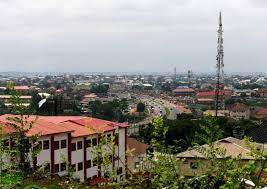By Isabelle Wilson-
The U.S State Department has ordered non-emergency US embassy employees and their family members in Abuja, Nigeria, to leave the country “due to the heightened risk of terrorist attacks there.”
The announcement came just two days after the department said it would allow nonessential personnel at the embassy in Abuja to depart voluntarily due to elevated security concerns. It did not provide details but the change suggested the U.S. has indications that an attack may be imminent.
The department further issued a “Level 3” travel advisory for the entire country, urging: “Reconsider travel to Nigeria due to crime, terrorism, civil unrest, kidnapping, and maritime crime.”
The news confirms the dangerous level of security issues in Africa’s most populous nation ahead of its forthcoming national elections.
Earlier this week, the State Department authorized the departure of non-emergency U.S. government employees and family members, having earlier warned of planned terror attacks in the Nigerian capital Abuja.
“Targets may include, but are not limited to, government buildings, places of worship, schools, markets, shopping malls, hotels, bars, restaurants, athletic gatherings, transport terminals, law enforcement facilities, and international organizations,” its October 23 advisory said of the alleged plots.
In an updated travel advisory issued Thursday, the State Department flagged 15 other Nigerian states in its “Do Not Travel” list due to risks ranging from terrorism to kid
Nigeria’s police say they are boosting security as the United States ordered the families of diplomats to leave the capital, Abuja, due to a “heightened risk of terrorist attacks”.
No specific threat was identified in the warning on Friday, but residents of the Federal Capital Territory (FCT) have been advised to be on high alert since Sunday after several Western embassies changed their travel advisories, citing an elevated risk. The US embassy in Abuja said possible targets include government buildings, places of worship and other public places. It has urged US citizens there to avoid all non-essential movements and crowds.
Nigerian security forces have been engaged in heavy battles with armed groups mostly in the northeast of the country, where an armed campaign by Boko Haram launched in 2009 has killed thousands and displaced millions. More recently, however, ISIL (ISIS)-allied fighters have claimed recent attacks near the capital.
The level of insurgency in Nigeria in the past year has been atrocious, but this latest warming is a sign of some level of foreknowing about an imminent attack in the country.
Insecurity continues to be one of Nigeria’s main problems amid a degenerating economy and multiple hostilities among various factions in the country, mainly exacerbated by a militant Islamic extremist group. It is one of the biggest challenges that will face whoever emerges victorious in te countries nex elections.
In July, the Islamic State in West Africa Province (ISWAP), an offshoot of Boko Haram now allied with ISIL, claimed responsibility for a raid on a prison in Abuja, freeing some 440 inmates and raising fears that fighters were spreading further.
In a statement late on Thursday, Nigerian police instructed “all strategic police managers in charge of commands and tactical formations within the country to beef up security in their respective jurisdictions, especially in the FCT”.
The inspector general of police, Usman Alkali Baba, said “all emergency numbers” should be activated to help ensure “a 24/7 prompt response with combats and men on standby”.
He urged residents of the city of about six million “to remain vigilant and report any suspicious or abnormal occurrence and persons to the police”.
The statement came as the US State Department on Thursday ordered the departure of diplomats’ families and also authorised the departure of non-emergency government employees from Abuja.
“Terrorists may attack with little or no warning,” targeting malls, markets, hotels, places of worship, restaurants, bars or schools, the State Department said in its country summary for Nigeria, but did not give further details.
On Thursday, Jabi Lake Mall, a large shopping centre in Abuja, was temporarily shut down for unspecified security reasons.
In addition to Abuja, the US advised citizens not to travel to a number of Nigerian states, including Borno and Yobe in the northeast.
Australia, Britain and Canada had also issued warnings last weekend, although the three countries had not ordered any evacuation of staff or their families as of Friday morning. Some European embassies and international organisations in Abuja have not updated their risk assessments or travel advisories.
“We have no crisis to manage, we are managing the panic,” a senior security manager with an international organisation based in the capital told AFP news agency, asking to remain anonymous.
“We don’t know what the motive is [behind the US evacuation]. We are taking some precautionary measures/actions, but activities are normal,” he added.
The government said Nigerians and foreigners in the country “should continue to be alert but must not panic”.
“I can assure all that our military and other security agencies have continued to do everything possible to secure and protect Nigerians and foreigners living in Nigeria,” said Lai Mohammed, minister of information and culture.
“Terrorists have been hard hit and put on the run,” he said during a news conference on Tuesday.
Armed groups in Nigeria generally operate in the northeast of the country, far away from the capital, though they have small cells in other parts of the country.
The last time one of the groups – Boko Haram – attacked the city centre was in 2014.
In addition to the groups’ threat, the capital is also surrounded by states with high levels of banditry – gangs of gunmen who kidnap and kill with no ideological motivation.
Analysts have warned that insecurity could worsen with the start of political campaigning for the general election to replace President Muhammadu Buhari next year.

